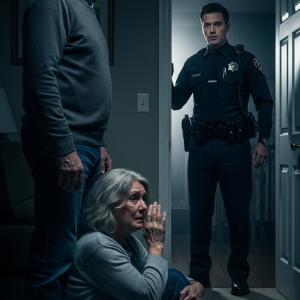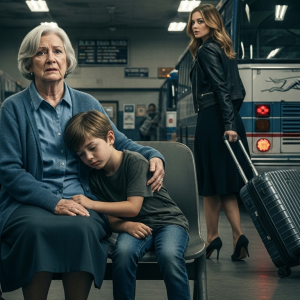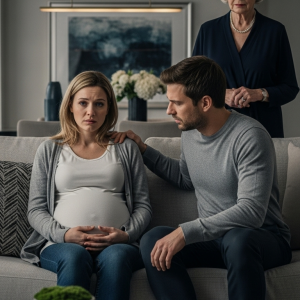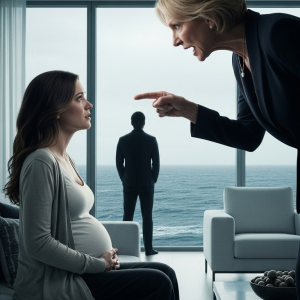The silence in the house was the hardest part. Six months after his wife Clara’s passing, Alex still found himself listening for the sound of her laughter in the kitchen or her footsteps on the stairs. The silence was a living entity, a constant, hollow echo of his loss. The only thing that chased it away was the bright, vibrant presence of his five-year-old daughter, Maya. She was the anchor in his storm, a perfect, miniature reflection of the woman he had lost.
His world had shrunk to the two of them, a small, fragile bubble of grief and healing. But that bubble was under constant, probing pressure from the outside, primarily from his mother-in-law, Diane. On the surface, Diane was the image of a grieving, supportive matriarch. She brought over casseroles, offered to babysit, and always had a sympathetic ear. But beneath the veneer of concern, Alex felt a discomfort he couldn’t quite name.
Her questions were relentless, but they rarely centered on his or Maya’s emotional well-being. Instead, they orbited a different, colder sun. “I do hope Clara had everything in order,” she’d say, her voice laced with a performative sadness. “It’s so important that Maya is provided for. Is her trust fund being managed properly?”
Alex, lost in his own fog of sorrow, initially dismissed it as a grandmother’s anxiety. “Clara was meticulous, Diane,” he’d assure her. “Everything is taken care of. Maya is secure.”
“But who oversees it?” she would press, her focus unnervingly sharp. “Until she’s of age, I mean. There are so many predatory people in the world. It must be a terrible burden for you, on top of everything else.” He saw concern; he couldn’t yet see the avarice glinting beneath.
Clara’s brother, Kevin, was a different story. He was adrift, shattered by the loss of his sister. He’d visit, but his presence was ghostly. He’d sit in the living room, staring at a photo of Clara, his eyes filled with a pain so profound it was difficult to witness. Alex saw a fellow mourner, and his heart went out to him. He missed the way Kevin’s gaze would often dart nervously towards his mother, the way he flinched almost imperceptibly when she spoke to him. He saw a shared grief, not the tormented silence of a reluctant conspirator.
Diane’s “support” soon took on a more insidious form. She became obsessed with his coping mechanisms. “Alex, you look exhausted,” she’d insist, a bottle of expensive Merlot in her hand. “You need to relax, for Maya’s sake. You can’t pour from an empty cup. Let me pour you a glass.”
He would politely decline, but she was persistent, framing his abstinence as a sign of instability. “It’s not healthy to bottle it all up,” she’d tell her friends in phone calls he was clearly meant to overhear. “I’m so worried about how he’s handling things. He’s just… not himself.” She was laying a foundation, brick by insidious brick, building a narrative of his incompetence, his fragility, his supposed failure as a father. She was turning his grief into a weapon she intended to use against him.
The evening was Diane’s creation from start to finish. She had called him three times that week, her voice a syrupy blend of concern and command. “Alex, you simply must take a break,” she’d insisted. “You haven’t had a single night to yourself since the funeral. Kevin and I are coming over Saturday. We’ll handle Maya, we’ll make dinner. You are going to sit on that sofa and do absolutely nothing. Doctor’s orders.”
He was too weary to argue. The idea of not having to be “on” for a few hours, of letting the crushing weight of single parenthood lift for even a moment, was too tempting. It felt like a surrender, but he told himself it was an act of self-preservation.
When they arrived, the atmosphere felt unnaturally staged. Diane bustled into the kitchen with bags of groceries, shooing him away with a theatrical flourish. Kevin trailed behind her, his eyes downcast, offering Alex a weak, fleeting smile. He looked pale and anxious, and Alex attributed it to the pain of being in his late sister’s home.
“Now, you sit,” Diane commanded Alex, pointing to the sofa. “Kevin will keep you company. I’ve brought that wonderful Cabernet you used to love.”
Alex hesitated. “I’m not sure I should, Diane. I have to be up early with Maya.”
“Nonsense,” she said, her tone leaving no room for debate. She returned with two glasses, filled to the brim. She handed one to Alex, her smile unwavering. “One glass, to toast Clara. To a wonderful mother and a beautiful daughter. She would want you to live, Alex. Not just to survive.”
Checkmate. He couldn’t refuse a toast to his wife. He took a sip. The wine was rich and smooth, but it tasted of obligation. Kevin barely touched his glass, his knuckles white as he gripped the stem.
As the evening wore on, Diane was relentless. She kept his glass full, brushing aside his protests. “Just one more. It’s helping you unwind. I can see the tension leaving your shoulders already.” She spoke of Clara, of memories, of the future, her words a hypnotic, lulling drone.
At one point, Maya ran into the room, her face bright. “Daddy, read me a story?”
Alex’s heart swelled. He put his glass down, ready to stand. “Of course, sweetie.”
Diane intercepted him, her hand on his shoulder, pressing him back down. “Oh no, you don’t,” she said with a laugh. “That’s Grandma’s job tonight. You stay put. Let me freshen that drink for you.” She picked up his half-full glass and took it to the kitchen. In that moment, while his attention was focused on Maya’s retreating form, the world pivoted on an invisible axis. He didn’t see the tiny vial she palmed from her pocket. He didn’t see the quick, furtive glance she shot at her son. He didn’t see the colorless liquid she expertly dripped into his wine.
When she returned, her smile was brighter than ever. “Here you are, dear. Now, drink up. We’re taking care of everything.”
He took the glass, thanking her. The first sip after that tasted no different. But within minutes, a strange, heavy languor began to creep over him. The room seemed to tilt, the edges of his vision blurring. Diane’s voice became a distant, muffled buzz. He tried to focus, to shake off the sudden, overwhelming wave of exhaustion. He looked at Kevin, but his brother-in-law wouldn’t meet his gaze. Kevin was staring at the floor, his face a mask of profound, sickening guilt.
Alex’s last coherent thought was that he had never felt so tired in his entire life. His head grew heavy, lolling back against the sofa cushions. The world dissolved into a soft, impenetrable blackness.
Waking up was a brutal, disorienting experience. Alex’s head throbbed with a pain so intense it felt like a physical wound. His mouth was dry as desert sand, and a wave of nausea rolled over him. He blinked, trying to make sense of his surroundings. He was still on the sofa. Sunlight was streaming through the window, painfully bright.
Then he saw the scene. On the coffee table in front of him were three empty bottles of wine, artfully arranged. An overturned glass lay on the floor, a dark stain spreading on the rug. The scene was perfectly, damningly staged to look like a man had drunk himself into a stupor. A cold, slithering dread began to replace his physical sickness. He had been played.
His phone buzzed. It was a text from Diane. “We took Maya back to our place for the night. Didn’t want to wake you. You clearly needed the rest. We need to talk.”
The talk came two days later, not in person, but in the form of a thick envelope delivered by a courier. They were custody papers. Diane was petitioning for emergency temporary guardianship of Maya, citing his “alcohol abuse” and “irresponsible behavior” as a danger to the child. The envelope contained glossy, high-resolution photographs of him passed out on the sofa, surrounded by the empty bottles.
The betrayal was so profound, so absolute, it left him breathless. This wasn’t just a disagreement; this was a meticulously planned character assassination. He spent the next few weeks in a desperate, defensive crouch. He hired a lawyer, a sharp, compassionate woman named Sarah Bennett. But their situation was bleak.
“They have photographic evidence, Alex,” Sarah told him, her expression grim. “You’ll have to submit to alcohol tests, character witnesses. We can fight it, but they’ve built a strong, if circumstantial, case. A grieving husband turning to the bottle… it’s a story a judge has heard a thousand times.” Alex felt the walls closing in. He was a father, fighting for his child, being portrayed as a menace.
Then, a week before the hearing, Sarah received a call from a blocked number. The caller was brief, his voice choked with anxiety. He said he had information about Alex’s case. He refused to give his name, but agreed to a clandestine meeting. The location was a quiet, little-used park on the other side of town.
When Sarah arrived, she found Kevin sitting on a bench, his head in his hands. He was a wreck, his face pale and drawn. He flinched when she approached.
“I can’t let her do this,” Kevin began, his voice a hoarse whisper, unable to meet her eyes. “I didn’t… I didn’t understand what she was really planning. Not until it was too late.”
He explained the whole sordid affair. Diane had manipulated him for months, feeding him lies about Alex’s supposed drinking problem. “She said we needed to get proof, to get him help, to ‘save’ Maya,” he choked out, the words tasting like poison. “She said it was the only way. She told me to film it, so the judge would believe us.”
The guilt was pouring out of him now, a torrent of shame and regret. “But it was never about helping Alex. It was about the money. All of it. The trust fund. She talked about it right before… right before she did it. I have it all.”
With trembling hands, he pulled out his phone and handed it to Sarah. “I kept filming,” he whispered, tears streaming down his face. “After she told me to stop, I just… I kept it recording. I don’t know why. Maybe some part of me knew I would need it.” He finally looked at her, his eyes pleading. “Please. Don’t let her win. Don’t let her use my sister’s daughter like this.” Sarah looked down at the phone in her hand. It was no longer just a piece of evidence. It was a bomb
The courtroom was an arena of quiet, suffocating tension. Alex sat beside Sarah, his hands clenched into fists in his lap. Across the aisle, Diane, dressed in a somber black suit, dabbed at her eyes with a handkerchief, the very picture of a heartbroken grandmother forced to take drastic action. The judge, a stern-faced woman named Judge Miller, looked down at them all with an expression of profound disapproval.
Diane’s lawyer, a slick, overconfident man, began his assault. He presented the large, glossy photographs of Alex, passed out amidst the empty wine bottles. He painted a vivid picture of neglect and dangerous alcoholism.
Then, Diane took the stand. Her performance was flawless. Tears streamed down her face as she spoke of her deep, abiding love for Maya and her “grave concerns” for her son-in-law.
“I love Alex,” she said, her voice trembling with emotion. “But grief does terrible things to people. I’ve tried to help him, to be there for him, but his drinking… it’s out of control. That night, I saw it with my own eyes. He drank himself into oblivion. What if there had been a fire? What if Maya had needed him? I cannot, in good conscience, stand by and let my granddaughter remain in such a dangerous environment.”
She was utterly convincing. Alex could feel the weight of the judge’s stare, cold and heavy. He could see the doubt creeping into the faces in the gallery. He was losing. The lies were winning.
When it was Sarah Bennett’s turn to cross-examine, she stood and approached the stand calmly. She didn’t challenge Diane’s testimony directly.
“Mrs. Langston,” Sarah began, her voice respectful. “You’ve presented these photographs as evidence of Mr. Reed’s state on the night in question. Is that correct?”
“Yes,” Diane said tearfully. “It breaks my heart to do so.”
“We don’t dispute the authenticity of these photos, Your Honor,” Sarah said, turning to the judge. “In fact, we would like to provide the court with some additional context as to how Mr. Reed came to be in that state. We have a video from that same evening.”
Diane’s lawyer shot to his feet. “Objection! We were not made aware of any video evidence!”
“It was provided to us by a new witness who came forward only recently, counsel,” Sarah replied smoothly. “A witness who was also present that evening.”
A large monitor was wheeled into the center of the courtroom. Diane watched with a look of smug confidence, likely assuming it was a video her own son had taken, one that would only corroborate her story. Her expression began to change only when she saw Kevin, sitting in the back of the courtroom, his face buried in his hands.
“Let’s play the video,” Sarah said.
The video began, shaky at first, clearly filmed on a smartphone. It showed the living room from a corner perspective. The audio was crystal clear. It was Diane’s voice.
“Make sure you get the bottles in the shot after he’s out, Kevin. Frame it nicely. The trust is controlled by the legal guardian. This is about securing Maya’s future… and ours. Clara would have wanted us to be comfortable.”
A collective gasp went through the courtroom. Diane’s face went white. Her lawyer stared at her, his mouth agape.
The video continued. It showed Alex on the sofa, talking to Maya. It showed Diane taking his glass to the kitchen. And then, the camera zoomed in, capturing the damning moment. It clearly showed Diane, her back mostly to Alex, taking out the small vial, uncapping it, and tipping its contents into the wine glass. It showed her swirling the glass once, twice, before turning back to Alex with a serene, motherly smile.
The courtroom was plunged into a dead, horrified silence. Every eye was on the screen, then on Diane. Her carefully constructed mask of a grieving grandmother didn’t just crack; it exploded, revealing the monstrous, greedy face beneath. She began to hyperventilate, her hand flying to her chest.
Judge Miller’s face, which had been stern, was now a thundercloud of pure, unadulterated fury. She stared at Diane with such intensity that it seemed the force of her gaze alone could strike the woman down.
The case wasn’t just lost. It had detonated, and Diane Langston was at the fiery center of the blast.
The aftermath in the courtroom was swift and merciless. Judge Miller slammed her gavel down, the sound cracking through the stunned silence like a rifle shot.
“This court is appalled,” she began, her voice low and seething with rage, her eyes locked on the trembling form of Diane on the witness stand. “In all my years on the bench, I have never witnessed such a craven, despicable act of perjury, manipulation, and outright cruelty.”
She didn’t even wait for a formal motion. “Ms. Langston’s petition for guardianship is dismissed with extreme prejudice. You are barred from ever filing for custody of this child again. Full and sole legal custody is hereby reaffirmed to the child’s father, Mr. Alex Reed.”
But she was far from finished. “Furthermore,” she continued, her voice rising, “this court is referring this entire matter, including the video evidence and the transcript of today’s testimony, to the District Attorney’s office for immediate criminal investigation. The charges will likely include perjury, filing a false report, and felony assault. Bailiff, please escort Ms. Langston from my courtroom. She is no longer a plaintiff here; she is a criminal defendant.”
Diane collapsed into a weeping, incoherent mess as a bailiff helped her from the stand, her own lawyer taking a full step away from her as if she were radioactive. She had walked into the courtroom as an accuser, a victim. She left in disgrace, her future a landscape of courtrooms, lawyers, and very possibly, a jail cell.
The destruction of her life was total. Her own son, Kevin, became the prosecution’s star witness in the criminal case against her, his guilt compelling him to tell the entire, sordid truth. The family she had tried to tear apart for money was now irrevocably shattered by her own hand. The friends and community who had offered her sympathy and support now saw her for what she was—a predator who used grief as camouflage.
Her identity, so carefully built on the image of a respectable, loving matriarch, was incinerated in the blaze of public justice. Her final punishment was not just a prison sentence, but one of complete and utter isolation. She had lost everything and everyone she had claimed to care about.
Months later, the legal battles were over. A permanent restraining order was in place. Alex and Maya were finally free. They were at the park, the late afternoon sun casting long shadows on the grass. Maya’s laughter, bright and carefree, filled the air as she chased a butterfly.
Alex watched her, a profound sense of peace settling over him for the first time in what felt like a lifetime. The long, dark shadow of Diane was gone. The silence in their house was no longer an emptiness, but a quiet space they could now fill with their own joy, their own memories, their own future. He had been through the fire of grief and betrayal, but he had walked out the other side, holding his daughter’s hand. The proof of his innocence had been in a glass of wine, but the proof of his resilience was here, laughing in the sunlight.




